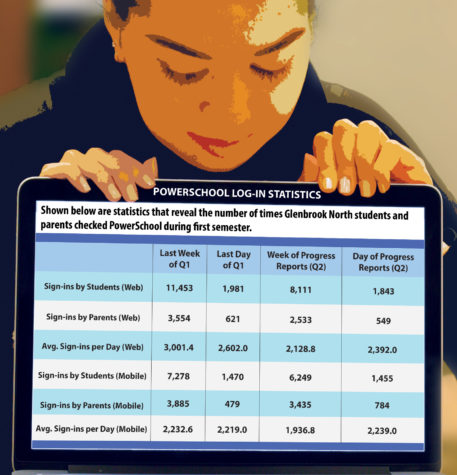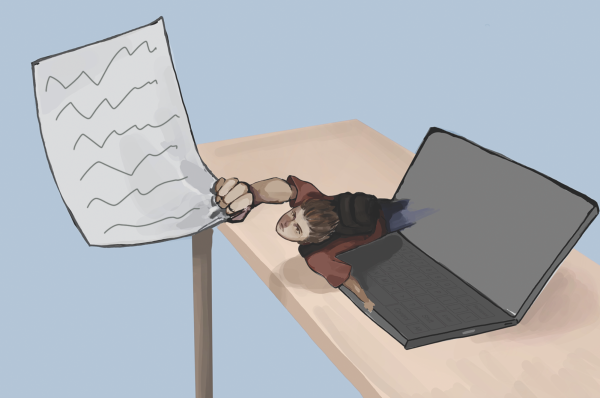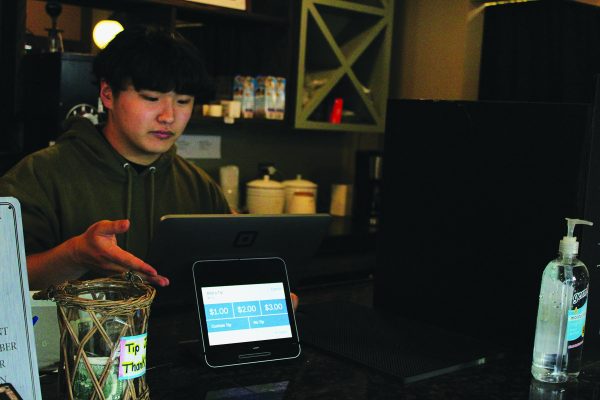PowerSchool drives academic stress, prompts obsessive habits

He was addicted to checking his grades. He was a grade-aholic.
Logging into PowerSchool had become second nature for senior Mark Wu, who said he and his parents had logged onto his PowerSchool over 1,500 times by the end of his freshman year.
“I would check [my grades] three to four times a day, and my parents would check them maybe two to three times a day,” Wu said.
Like many students, Wu had succumbed to the temptations of PowerSchool by checking his grades constantly.
When coupled with parents’ high academic expectations, this behavior can contribute to heightened grade anxiety, which often leads students to endure chronic stress and lowers self-esteem.
Marya Gwadz, licensed clinical psychologist and senior research scientist at New York University College of Nursing, was the principal investigator of a study that explored high schoolers’ experiences with stress in relation to their academic success and mental health. The researchers found that 49 percent of the students studied reported feeling a “great deal of stress” on a daily basis, which was perpetuated by grades.
Gwadz said she thinks students are too concerned with grades, which contributes to their academic stress and increases their tendencies to check PowerSchool. A major stressor is getting into college, which puts pressure on students to perform well and thereby leads them to check their grades more frequently.
She said the constant availability of grades via PowerSchool sounds like a “nightmare.”
“[It] seems like [a] constant reminder about what you should be doing [academically], — what you didn’t do, things that went well, things that didn’t go well — and I can’t imagine that would be good,” Gwadz said.
Wu said when his sophomore year began, he started to check his grades less often in order to alleviate some of the stress that his frequent grade-checking had caused. He now checks his grades about once a week.
“[My freshman year], when I had a low grade, I would stress about it, … I would have nightmares about it, and it was just not good for me,” said Wu. “And, I totally changed that sophomore and junior year, and I’m really happy I did.”
Social studies teacher Robin Sheperd said the ability that students have to check their grades on PowerSchool causes them to constantly look for feedback through a grade, allowing the anxiety that comes with completing an assignment or a test to continuously concern them.
Sheperd said that although PowerSchool is a “great convenience,” she worries it has become a distraction. She once accidentally entered grades out of 10 points instead of five points, so during the middle of the school day and within minutes of submitting these grades, she received emails from concerned students.
“That’s when I became aware that, ‘Alright, where are you right now that you’re emailing me?’” said Sheperd. “‘You’re in another class.’ So, it becomes this distraction from whatever [students] are supposed to be doing.”
Junior Kate Larsen said she checks her grades two to three times a week because she prefers seeing her test grades before having them handed back in class to relieve some of her anxiety.
Larsen’s mother Sheela Larsen said she usually checks her daughter’s grades daily. She emphasizes good grades to her daughter to maximize future opportunities like getting into a favorable college.
Although they are just trying to do what is best for their children, Gwadz said parents contribute to students’ academic stress.
“[Parents] want to do right by their [kids], and they’re in this system where how you do right by your [kids] is giving them every opportunity to get the best grades that they can,” Gwadz said.
Lucia Ciciolla, assistant professor of psychology at Oklahoma State University, said she believes students and parents are both overly fixated on grades, and this fixation is amplified by the existence of online grades.
Ciciolla said emphasis on students’ academic achievements are growing concerns because they create a “pressure cooker” so that students cannot think or act beyond what they need to do to achieve good grades. Although this pressure — which is perpetuated by online grades — heightens students’ anxiety, decreases their self-esteem and can lead to depression, Ciciolla does not see PowerSchool as an inherently negative resource.
“Knowing what your grade is and being able to log in isn’t a bad thing,” said Ciciolla. “When it becomes too much of a focus, [and it] becomes something you have to check because of anxiety, [then that] could signal that [checking PowerSchool] could be an issue.”
When he was frequently checking his grades, Wu said he worried about every point that he lost on each assignment, although he realized these point values would not make a difference in the grand scheme of his overall grade.
“It definitely stressed me out a lot because every single point … makes you debate, ‘Alright, I’m going to get a B now, or I’m going to get a C now,’ and one or two points isn’t going to [alter] your grade one way or another, but when you check that often, it makes you think it does,” Wu said.
To appropriately cope with this stress, Gwadz said students should not be afraid to seek necessary mental health care, and she encourages parents to fight against the system by calling for reduced homework and by reducing the pressure they put on their children.
She said students should remember that they are more than just a grade.
“As your life goes on, your letter grade is going to be the least important thing about you,” said Gwadz. “[Your] character is much more important [than your grade], your resilience is much more important [and] whether you can be a good friend is much more important.”









